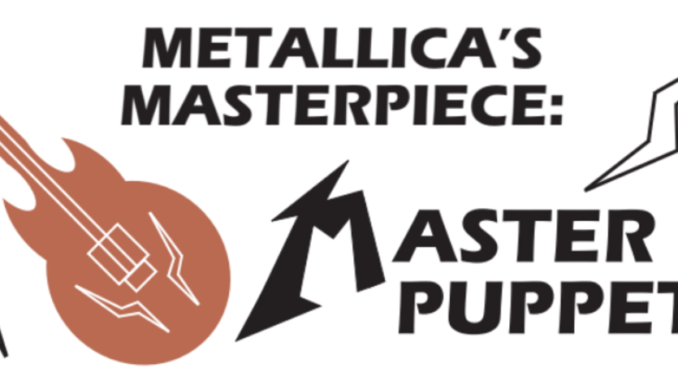
Metallica is one of the most popular and well-known metal bands of all time. If you’ve ever been to a sporting event or turned on rock radio, odds are you’ve probably heard “Enter Sandman” or another Metallica song. The band’s impact on the metal genre cannot be overstated, particularly with the release of its third album, “Master of Puppets.”
Clocking in at just under 55 minutes, “Master of Puppets” is a masterpiece. Released in 1986, Metallica took its tried and true formula of thrash metal aggression and pushed the envelope of what critics thought was capable. The album mixes fast paced, aggressive tempos with melodic, and at times gentle, sections. These slower paced and melodic sections are not only heavy in their own rights — see “The Thing That Should Not Be” — but also serve to make the faster sections seem even faster and louder. The album sees Metallica at its best, flawlessly spitting out long epics — the shortest song is five minutes long — that will have you headbanging until your neck is sore and then headbanging some more.
After facing accusations of “selling out” with an acoustic intro on a ballad released on their previous record, Metallica fired back with an acoustic intro to one of their heaviest songs, “Battery.” The thrash masterpiece perfectly sets the tone for the record, giving the listener a preview of precisely what is in store. While the album has straightforward thrasher songs like “Battery” and “Damage, Inc.,” many of the other songs explore societal issues.
The title track deals with any sort of coercive force that holds power over one’s life. “Welcome Home (Sanitarium)” is a ballad-like song that explores the treatment of patients in a mental health hospital in a “One Flew Over the Cuckoo’s Nest”-esque way. “Disposable Heroes” is a sharp critique of not only the military but also professional football at a time where player safety and well-being was disregarded in favor of a win. “Leper Messiah” criticizes televangelists and religious figures that seem to only care about making money and garnering fame.
The only criticism for this album is that at times, the length of the songs can drag on, causing the listener to lose focus. As songs stretch over the five and six minute mark, it can be easy to start to drift away from the music. However, the songs are so good that I rarely find myself doing this — honestly, I’m just nitpicking. The songs are so well done that the length doesn’t significantly impact the listening experience.
As the last album to feature bassist Cliff Burton before his tragic death on tour, the album is a lasting tribute to his brilliant work as a crucial band member. Listening to his beautifully haunting intro to “Damage, Inc.” always gives me chills and occasionally makes me misty-eyed to recall the incredible talent Cliff possessed.
Coming in at No. 2 on Rolling Stone’s “100 Greatest Metal Albums of All Time,” “Master of Puppets” is a true work of art. In 2015, it was selected by the Library of Congress to be preserved in the National Recording Registry for being “culturally, historically or aesthetically significant.” After all these accolades, to say that “Master of Puppets” is Metallica’s best album and one of the greatest of all time seems like an understatement.
★★★★★
